
- Home
- न्यूजग्राम
- India
- World
- Politics
- Entertainment
- Culture
- Lifestyle
- Economy
- Sports
- Sp. Coverage
- Misc.
- NewsGram Exclusive
- Jobs / Internships

Agartala/Guwahati: The signing of the historic Land Boundary Agreement, notwithstanding some opposition in Assam, and trade and connectivity are the key issues which have generated keen interest in India's northeastern states about Prime Minister Narendra Modi's two-day Bangladesh visit that began on Saturday.
In a historic step, India and Bangladesh during the day moved to swap land enclaves in each other's territory as they ratified the more than 40-year-old LBA at a ceremony witnessed by Modi and his Bangladesh counterpart Sheikh Hasina.
The agreement envisages transfer of 111 enclaves with a total area of 17,160.63 acres to Bangladesh. Dhaka is to transfer 51 enclaves spread over 7,110.02 acres to India. A 6.1-km undefined border stretch will be demarcated. The four Indian border states involved in the exchange of territories are Assam, Meghalaya, Tripura – all in the northeast – and West Bengal.
With the Teesta accord, which Bangladesh considers very important, not on the agenda, diplomatic experts were banking on the land swap deal – set to be concluded on June 6 on day one of Modi's visit – as a "significant chapter" in India-Bangladesh relations, which could in turn pave the way for fresh openings in bilateral ties.
Veena Sikri, former Indian envoy to Bangladesh, termed the LBA the high point of the visit as it would help in taking the bilateral relations between the two neighbours into an era of connectivity, which would tremendously help the northeastern states.
Northeast-based independent journalist Sanath Chakrabarty termed the LBA signing a welcome step.
"The initiative shows that the Modi government does not want to carry the baggage of the past. They want to solve the issues in a more proactive way, this is a good move," he said.
"However, there are issues which are irritants. The Land Boundary Agreement has also been opposed by several sections. There issues of rehabilitation and resettlement of the people to be affected by the LBA," he said, adding that one also has to observe how Bangladesh reciprocates to this.
Modi, Hasina and West Bengal Chief Minister Mamata Banerjee also flagged off the Kolkata-Dhaka-Agartala and Dhaka-Shillong-Guwahati bus services.
The two countries signed 22 pacts, including agreements on coastal shipping, renewal of protocol on inland water transit and trade, on prevention of human trafficking and on prevention of smuggling and circulation of fake currency notes.
The two nations also concluded the memorandum of understanding on use of Chittagong and Mongla ports, while the Bangladesh Submarine Cable Company Limited (BSCCL) and Bharat Sanchar Nigam Limited (BSNL) signed a deal for leasing of international bandwidth for internet at Akhaura in Tripura.
Stressing on connectivity, Modi said Bangladesh's decision to allow transit of power equipment and foodgrain to the northeast "echoes the strength of your human values and our shared economic opportunities".
On Sunday, Modi and Hasina are scheduled to open the Kamalasagar (Tripura)-Kasba (Bangladesh) border haat. The border haat will be the second in Tripura and the fourth along the India-Bangladesh border.
These border haats are being set up at costs ranging from Rs.2.4-3 crore incurred by the Indian commerce ministry to boost trade in local produce of areas on the two sides.
Tripura Chamber of Commerce and Industries president M.L. Dey said Bangladesh's trade and business with the northeastern states was much higher compared to the rest of India.
"Considering this scope, both India and Bangladesh must take more mutual steps to increase the trades and various economic activities between Bangladesh and eight northeastern states of India."
Noted economist Sekhar Paul said economic cooperation between India and Bangladesh "must go hand in hand with strong political support from the highest places of the two close neighbours".
The eight northeastern states, including Sikkim, are largely dependent on Punjab, Haryana, West Bengal, Delhi, Uttar Pradesh and other bigger states in India for food grains, essential commodities and household goods.
"Trade between the northeastern states and Bangladesh are gradually increasing every year. With Modi's visit, the cross border trade might further boost up," Habul Biswas, secretary of the Exporters-importers Association of Tripura, told IANS.
Tripura Chief Minister Manik Sarkar earlier told IANS the visit was expected to immensely benefit the northeastern states.
He said Dhaka helped "a lot" to tame decades of terrorism in Tripura.
But he pointed out that some camps of northeastern militants still existed in Bangladesh. (IANS)
